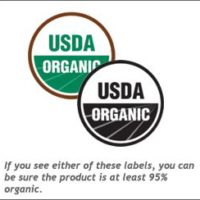Organic, organic, organic. How many times have you heard that word in the last ten years? How about the last five years? This word is so popular nowadays that food companies are slapping it on anything and everything, just to make you think you are eating something healthy. Buyers, beware of these tricky little fellas. There are organic UNHEALTHY, PROCESSED, JUNK foods galore in the grocery store. Man, if organic equaled healthy, right now I would eat some organic cake with organic icing and wash it down with an organic diet soda. HA! One could only dream…which I certainly would be doing because I would be in a sugar coma. Or not, because does one even dream while in a coma? Alright, calm down, I know I’m no comedian. Don’t worry, I’m keeping my day job cookin’ and just tellin’ jokes to myself.
Many friends and clients of mine often feel overwhelmed about buying organic foods. Most people know that organic usually means more spending more dough. And no, not cookie dough. While organic foods are usually more expensive, in reality you don’t necessarily need to buy ALL organic, so stress no longer. I have the 411 on organic foods and how to prioritize your list so that you aren’t breaking the bank. This following is prioritized as most important to least important, so if you can’t buy all organic, just focus on the first few!
Meats
Unlike non-organic meats (is there such a thing as certified non-organic?! LOL), certified organic meats do not contain any pesticides, herbicides, synthetic fertilizers, additives, GMOs, preservatives, or any of that other guck. Might I add, I have cooked all kinds of meats. I can’t even describe the difference between slicing organic meat and non-organic meat. Literally, cutting organic meat feels like you are cutting butter. It isn’t pumped up with water and antibiotics and everything else imaginable.
Dairy
IF you are going to eat dairy (because let’s face it, this is a very controversial food group for various reasons), organic is definitely the way to go. Conventional milk is jam-packed with growth hormones that just so happen to be banned in 30+ countries (no big deal, guys), antibiotics, herbicides, pesticides, and GMOs (because of the cows’ diet), leaving little room for the nutritional goodness found in organic milk.
Fruits and Veggies
We’ve all heard of the Dirty Dozen and the Clean Fifteen. Basically, something with a thick skin, like an avocado or banana, doesn’t need to be organic. But the “baldies”, like apples, spinach and strawberries should definitely be organic!
Grains
Okay, unfortunately it doesn’t seem to matter if you buy organic or not. Apparently, the toxic pesticide, glyphosate (remember this scary word, as it could actually be the problem of wheat intolerances, NOT gluten, sorry gluten-phobes!) is found on organic wheat, despite the fact that it is not supposed to be!
Nuts, Seeds, Beans, & Legumes
Definitely not something to stress over. But, if you choose to, here are the most important ones to buy organic: almonds, peanuts, pecans, and soybeans (or foods that are made from soybeans, like tofu). Mainly because these guys are hit with toxic pesticides the most.
Processed Foods
Yeah, they’re on the bottom of the list because they’re still PROCESSED, people. Need I say more?

